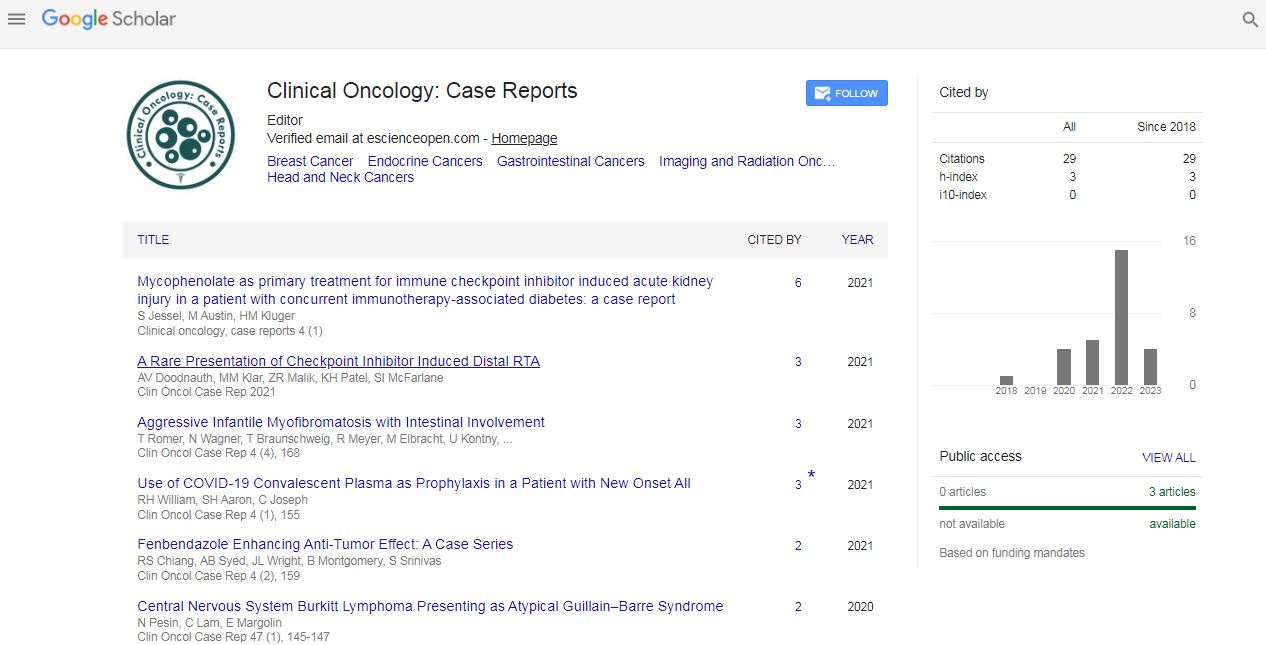Case Report, Clin Oncol Case Rep Vol: 4 Issue: 3
Diabetic Ketoacidosis upon Initiation of Alpelisib: Two Case Reports
Rebecca Jeun1, Victor Lavis2 and Sonali Thosani2*
1Section of Endocrinology, Diabetes and Metabolism, Baylor College of Medicine, Houstan, Texas, USA
2Department of Endocrine Neoplasia & Hormonal Disorders, University of Texas MD Anderson Cancer Center, Houston, Texas, USA
- *Corresponding Author:
- Sonali Thosani
Department of Endocrine Neoplasia & Hormonal Disorders
University of Texas MD Anderson Cancer Center
1400 Pressler Road-Unit 1461, Houston, TX, USA
E-mail: SThosani@mdanderson.org
Received: December 29, 2020 Accepted: February 28, 2021 Published: March 25, 2021
Citation: Jeun R, Lavis V, Thosani S (2021) Diabetic Ketoacidosis upon Initiation of Alpelisib: Two Case Reports. Clin Oncol Case Rep 4:3
Abstract
Background: Alpelisib is an isoform specific phosphoinositide 3 kinase inhibitor recently approved for use in hormone receptor positive metastatic breast cancer that has been shown to cause hyperglycemia in 31%-82% of patients in clinical trials to date. Two patients in clinical trials of alpelisib developed diabetic ketoacidosis and one case was reported two months after initiating alpelisib. Here, we present two cases of diabetic ketoacidosis that occurred within six weeks of initiating alpelisib.
Case presentation: The first case was a 55-year-old woman with a history of metastatic hormone-receptor positive breast cancer, on treatment with fulvestrant and alpelisib. She did not have a prior history of diabetes mellitus and presented to the emergency center in diabetic ketoacidosis one week after starting alpelisib. The second case involved a 56-year-old woman with a history of metastatic hormone-receptor positive breast cancer and well controlled type 2 diabetes mellitus admitted with diabetic ketoacidosis one month after starting empagliflozin and five weeks after starting alpelisib. Both patients were eventually able to come off insulin
Conclusions: Current manufacturer guidelines for alpelisib recommend screening for diabetes at baseline and monitoring blood glucose and/or fasting plasma glucose weekly for the first two weeks of treatment and monthly thereafter. However, patients with no pre-existing history of diabetes, may be at risk for life-threatening hyperglycemic crises even within a week of initiation of alpelisib. Sodium glucose transporter 2 inhibitors have been suggested as a possible method of offsetting the hyperglycemia and resultant hyperinsulinemia with phosphoinositide 3 kinase inhibition. However, they may predispose patients to development of diabetic ketoacidosis with mild hyperglycemia which may not be easily detected with glucose monitoring at home. Once the drug is withdrawn, the hyperglycemic effect is reversible, and even patients that present with DKA can be managed with oral medications alone if they have no underlying problem with insulin production.
 Spanish
Spanish  Chinese
Chinese  Russian
Russian  German
German  French
French  Japanese
Japanese  Portuguese
Portuguese  Hindi
Hindi 